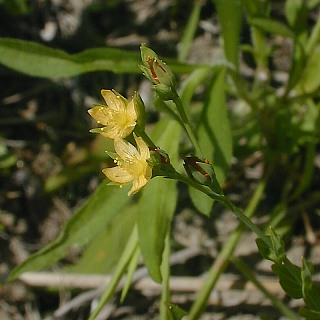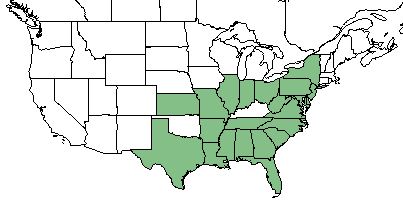Difference between revisions of "Hypericum gymnanthum"
(→Habitat) |
|||
| Line 1: | Line 1: | ||
{{italic title}} | {{italic title}} | ||
| + | Common Names: claspingleaf St. Johnswort <ref name= "USDA"> [https://plants.usda.gov/core/profile?symbol=CEAM USDA Plant Database]</ref> | ||
<!-- Get the taxonomy information from the NRCS Plants database --> | <!-- Get the taxonomy information from the NRCS Plants database --> | ||
{{taxobox | {{taxobox | ||
Revision as of 19:21, 14 June 2018
Common Names: claspingleaf St. Johnswort [1]
| Hypericum gymnanthum | |
|---|---|

| |
| Photo from Illinois Wildflowers Plant Database | |
| Scientific classification | |
| Kingdom: | Plantae |
| Division: | Magnoliophyta - Flowering plants |
| Class: | Magnoliopsida - Dicots |
| Order: | Theales |
| Family: | Clusiaceae |
| Genus: | Hypericum |
| Species: | H. gymnanthum |
| Binomial name | |
| Hypericum gymnanthum L | |

| |
| Natural range of Hypericum gymnanthum from USDA NRCS Plants Database. | |
Contents
Taxonomic Notes
Synonym:none
Variety:none
Description
H. gymnanthum is a perennial forb/herb of the Clusiaceae family that is native to North America. [1]
Distribution
H. gymnanthum is found throughout the eastern United States is a number of states; Florida, Georgia, South Carolina, North Carolina, Alabama, Mississippi, Louisiana, Texas, Arkansas, Tennessee, Virginia, Missouri, Kansas, Illinois, Indiana, Ohio, West Virginia, Pennsylvania, Maryland, New Jersey, and New York. [1]
Ecology
Habitat
Common habitats include pine savannas, wet pine flatwoods, sinkole ponds, and other wet habitats. [2]
General habitats are the Atlantic and Gulf COastal Plain, Eastern Mountains, great Plains, Midwest, Northcentral and Northeast. [1]
Phenology
H. gymnanthum flowers in May, July, and August. [3]
Conservation and Management
H. gymnanthum is considered endangered in Maryland and Ohio. It is being extirpated ini Pennsylvania. [1]